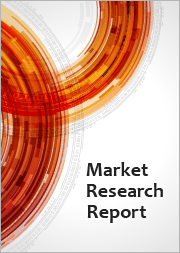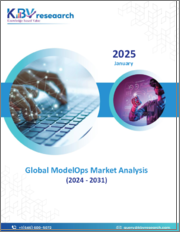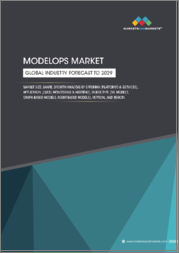
|
시장보고서
상품코드
1527328
ModelOps 시장 규모 조사 : 제공 제품별, 모델 유형별, 용도별, 산업별, 지역별 예측(2022-2032년)Global ModelOps Market Size study, by Offering, by Model Type, by Application, by Verticals and Regional Forecasts 2022-2032 |
||||||
세계 ModelOps 시장은 2023년 54억 달러 규모이며, 2024년부터 2032년까지 예측 기간 동안 40.28% 이상의 견실한 성장률로 성장할 것으로 예상됩니다.
모델 운영(ModelOps)은 프로덕션 환경에서 머신러닝(ML) 및 인공지능(AI) 모델을 배포, 모니터링, 관리 및 확장하는 엔드투엔드 프로세스를 말합니다. 모델 버전 관리, 거버넌스, 컴플라이언스, 성능 모니터링 등 다양한 활동이 포함되며, 모델 운영은 모델이 효율적으로 배포되고 실제 용도에서 실행될 수 있도록 보장함으로써 데이터 과학과 IT 운영의 간극을 메우는 것을 목표로 합니다. 목적으로 합니다. 모델 운영을 자동화하고 간소화함으로써 ModelOps는 조직이 AI 및 ML 투자에서 빠르게 가치를 창출하고, 장기적으로 모델의 정확성을 유지하며, 규제 요건을 준수할 수 있도록 돕습니다. 이는 AI 이니셔티브를 확장하고 모델을 비즈니스 프로세스에 원활하게 통합하고자 하는 기업에게 매우 중요합니다.
세계 ModelOps 시장은 ModelOps와 DevOps 및 DataOps 프레임워크와의 통합이 중요한 시장 성장 촉진요인으로 작용하고 있습니다. 이러한 시너지 효과는 업무 효율성을 높이고 워크플로우를 간소화하며 모델 개발과 배포 간의 격차를 해소합니다. 또한, 모델옵스에 대한 수요는 방대한 데이터 세트를 빠르고 정확하게 처리하고 해석할 수 있는 고급 분석 솔루션을 필요로 하는 데이터 양의 급증으로 인해 더욱 강화되고 있습니다. 그러나 모델의 해석 가능성과 설명가능성이라는 과제가 걸림돌로 작용하고 있습니다. 조직은 복잡한 모델을 이해하고 검증하는 데 어려움을 겪고 있으며, 이는 광범위한 채택을 가로막는 요인으로 작용하고 있습니다.
세계의 ModelOps 시장 조사에서 고려된 주요 지역은 아시아태평양, 북미, 유럽, 중남미 및 기타 지역으로, 2023년 북미는 ModelOps 시장의 지배적인 지역으로 부상할 것으로 예상됩니다. 이러한 리더십은 클라우드 컴퓨팅 및 분석 플랫폼을 포함한 탄탄한 기술 인프라와 세계 기업의 집중으로 뒷받침되고 있습니다. 이 지역의 규제 환경, 숙련된 인력 및 학문적 기여는 시장 지위를 더욱 강화합니다. 북미의 조직들은 모델 배포를 강화하고, 컴플라이언스를 준수하며, 혁신을 촉진하기 위해 ModelOps를 활용하고 있습니다. 또한, 아시아태평양 시장은 2024년부터 2032년까지 예측 기간 동안 가장 빠른 속도로 발전할 것으로 예상됩니다.
목차
제1장 세계의 ModelOps 시장 주요 요약
- 세계의 ModelOps 시장 규모와 예측(2022년-2032년)
- 지역별 개요
- 부문별 개요
- 제공 제품별
- 모델 유형별
- 용도별
- 업계별
- 주요 동향
- 경기후퇴의 영향
- 애널리스트의 결론 및 제안
제2장 세계의 ModelOps 시장 정의와 조사의 전제조건
- 조사 목적
- 시장의 정의
- 조사의 전제조건
- 포함과 제외
- 제한 사항
- 공급측 분석
- 가용성
- 인프라
- 규제 환경
- 시장 경쟁
- 경제성(소비자 시점)
- 수요측 분석
- 규제 프레임워크
- 기술 진보
- 친환경
- 소비자 의식과 수용
- 조사 방법
- 조사 대상년도
- 통화 환산율
제3장 세계의 ModelOps 시장 역학
- 시장 성장 촉진요인
- 시장이 해결해야 할 과제
- 시장 기회
제4장 세계의 ModelOps 시장 산업 분석
- Porter's Five Forces 모델
- 공급 기업의 교섭력
- 바이어의 교섭력
- 신규 진출업체의 위협
- 대체품의 위협
- 경쟁 기업간 경쟁 관계
- Porter's Five Forces 모델에 대한 미래적 접근
- Porter's Five Forces의 영향 분석
- PESTEL 분석
- 정치
- 경제
- 사회
- 기술
- 환경
- 법률
- 주요 투자 기회
- 주요 성공 전략
- 파괴적 동향
- 업계 전문가의 견해
- 애널리스트의 결론 및 제안
제5장 세계의 ModelOps 시장 규모와 예측 : 제공 제품별, 2022-2032년
- 부문 대시보드
- 세계의 ModelOps 시장 : 매출 동향 분석, 2022년/2032년
- 플랫폼
- 전개 모드
- 서비스
제6장 세계의 ModelOps 시장 규모와 예측 : 모델 유형별, 2022-2032년
- 부문 대시보드
- 세계의 ModelOps 시장 : 매출 동향 분석, 2022년/2032년
- ML 모델
- 그래프 기반 모델
- Rule & Heuristic Models
- 언어 모델
- 에이전트 기반 모델
- Bring Your Own Models
- 기타 모델 유형
제7장 세계의 ModelOps 시장 규모와 예측 : 용도별, 2022-2032년
- 부문 대시보드
- 세계의 ModelOps 시장 : 매출 동향 분석, 2022년/2032년
- 지속적 통합/지속적 전개
- Batch Scoring
- 거버넌스/리스크/컴플라이언스
- 병렬화 및 분산 컴퓨팅
- 모니터링 및 경계체제
- 대시보드 및 보고서
- 모델 수명주기 관리
- 기타
제8장 세계의 ModelOps 시장 규모와 예측 : 업계별, 2022-2032년
- 부문 대시보드
- 세계의 ModelOps 시장 : 매출 동향 분석, 2022년/2032년
- 은행/금융서비스/보험(BFSI)
- 소매 및 E-Commerce
- 헬스케어 및 생명과학
- 통신
- IT/ITeS
- 에너지 및 유틸리티
- 제조업
- 운송 및 물류
- 정부 및 방위
- 기타 업계별
제9장 세계의 ModelOps 시장 규모와 예측 : 지역별, 2022-2032년
- 북미
- 미국
- 캐나다
- 유럽
- 영국
- 독일
- 프랑스
- 스페인
- 이탈리아
- 기타 유럽
- 아시아태평양
- 중국
- 인도
- 일본
- 호주
- 한국
- 기타 아시아태평양
- 라틴아메리카
- 브라질
- 멕시코
- 기타 라틴아메리카
- 중동 및 아프리카
- 사우디아라비아
- 남아프리카공화국
- 기타 중동 및 아프리카
제10장 경쟁 정보
- 주요 기업의 SWOT 분석
- 주요 시장 전략
- 기업 개요
- IBM
- 주요 정보
- 개요
- 재무(데이터 입수가 가능한 경우)
- 제품 개요
- 시장 전략
- Oracle
- SAS Institute
- AWS
- Teradata
- Palantir
- Veritone
- Altair
- c3.ai
- IBM
제11장 조사 과정
- 조사 과정
- 데이터 마이닝
- 분석
- 시장 추정
- 검증
- 출판
- 조사 속성
Global ModelOps Market is market is valued at USD 5.4 billion in 2023 and is anticipated to grow with a healthy growth rate of more than 40.28% over the forecast period 2024-2032. ModelOps (Model Operations) refers to the end-to-end process of deploying, monitoring, managing, and scaling machine learning (ML) and artificial intelligence (AI) models in production environments. It encompasses a wide range of activities, including model versioning, governance, compliance, and performance monitoring. ModelOps aims to bridge the gap between data science and IT operations by ensuring that models are deployed efficiently and perform reliably in real-world applications. By automating and streamlining the operationalization of models, ModelOps helps organizations quickly derive value from their AI and ML investments, maintain model accuracy over time, and comply with regulatory requirements. This discipline is crucial for enterprises looking to scale their AI initiatives and integrate models seamlessly into their business processes.
The Global ModelOps Market is driven by integration of ModelOps with DevOps and DataOps frameworks represents a significant driver for the market. This synergy enhances operational efficiency, streamlines workflows, and bridges the gap between model development and deployment. Furthermore, the demand for ModelOps is bolstered by the surge in data volumes requiring advanced analytics solutions capable of processing and interpreting vast datasets swiftly and accurately. However, challenges possess model interpretability and explainability pose restraints. Organizations often grapple with understanding and validating complex models, which can hinder broader adoption.
The key regions considered for the Global ModelOps Market study includes Asia Pacific, North America, Europe, Latin America, and Rest of the World. In 2023, North America stands out as a dominant region in the ModelOps market. This leadership is underpinned by robust technological infrastructure, including cloud computing and analytics platforms, and a concentration of global enterprises. The region's regulatory environment, skilled workforce, and academic contributions further reinforce its market position. Organizations in North America leverage ModelOps to enhance model deployment, ensure compliance, and foster innovation. Furthermore, the market in Asia Pacific is anticipated to develop at the fastest rate over the forecast period 2024-2032.
Major market players included in this report are:
- IBM
- Oracle
- SAS Institute
- AWS
- Teradata
- Palantir
- Veritone
- Altair
- c3.ai
The detailed segments and sub-segment of the market are explained below:
By Offering:
- Platforms
- Deployment Mode
- Services
By Model Type:
- ML Models
- Graph-Based Models
- Rule & Heuristic Models
- Linguistic Models
- Agent-Based Models
- Bring Your Own Models
- Other Model Types
By Application:
- Continuous Integration/Continuous Deployment
- Batch Scoring
- Governance, Risk and Compliance
- Parallelization & Distributed Computing
- Monitoring & Alerting
- Dashboard & Reporting
- Model Lifecycle Management
- Others
By Verticals:
- BFSI
- Retail & eCommerce
- Healthcare & Life sciences
- Telecommunications
- IT/ITeS
- Energy & Utilities
- Manufacturing
- Transportation & Logistics
- Government & Defense
- Other Verticals
By Region:
- North America
- U.S.
- Canada
- Europe
- UK
- Germany
- France
- Spain
- Italy
- ROE
- Asia Pacific
- China
- India
- Japan
- Australia
- South Korea
- RoAPAC
- Latin America
- Brazil
- Mexico
- RoLA
- Middle East & Africa
- Saudi Arabia
- South Africa
- RoMEA
Years considered for the study are as follows:
- Historical year - 2022
- Base year - 2023
- Forecast period - 2024 to 2032
Key Takeaways:
- Market Estimates & Forecast for 10 years from 2022 to 2032.
- Annualized revenues and regional level analysis for each market segment.
- Detailed analysis of geographical landscape with Country level analysis of major regions.
- Competitive landscape with information on major players in the market.
- Analysis of key business strategies and recommendations on future market approach.
- Analysis of competitive structure of the market.
- Demand side and supply side analysis of the market
Table of Contents
Chapter 1. Global ModelOps Market Executive Summary
- 1.1. Global ModelOps Market Size & Forecast (2022-2032)
- 1.2. Regional Summary
- 1.3. Segmental Summary
- 1.3.1. By Offering
- 1.3.2. By Model Type
- 1.3.3. By Application
- 1.3.4. By Verticals
- 1.4. Key Trends
- 1.5. Recession Impact
- 1.6. Analyst Recommendation & Conclusion
Chapter 2. Global ModelOps Market Definition and Research Assumptions
- 2.1. Research Objective
- 2.2. Market Definition
- 2.3. Research Assumptions
- 2.3.1. Inclusion & Exclusion
- 2.3.2. Limitations
- 2.3.3. Supply Side Analysis
- 2.3.3.1. Availability
- 2.3.3.2. Infrastructure
- 2.3.3.3. Regulatory Environment
- 2.3.3.4. Market Competition
- 2.3.3.5. Economic Viability (Consumer's Perspective)
- 2.3.4. Demand Side Analysis
- 2.3.4.1. Regulatory frameworks
- 2.3.4.2. Technological Advancements
- 2.3.4.3. Environmental Considerations
- 2.3.4.4. Consumer Awareness & Acceptance
- 2.4. Estimation Methodology
- 2.5. Years Considered for the Study
- 2.6. Currency Conversion Rates
Chapter 3. Global ModelOps Market Dynamics
- 3.1. Market Drivers
- 3.1.1. Integration of ModelOps with DevOps and DataOps
- 3.1.2. Increase in Data Volume
- 3.2. Market Challenges
- 3.2.1. Model Interpretability and Explainability
- 3.3. Market Opportunities
- 3.3.1. Integration of Automated CI/CD Pipelines
Chapter 4. Global ModelOps Market Industry Analysis
- 4.1. Porter's 5 Force Model
- 4.1.1. Bargaining Power of Suppliers
- 4.1.2. Bargaining Power of Buyers
- 4.1.3. Threat of New Entrants
- 4.1.4. Threat of Substitutes
- 4.1.5. Competitive Rivalry
- 4.1.6. Futuristic Approach to Porter's 5 Force Model
- 4.1.7. Porter's 5 Force Impact Analysis
- 4.2. PESTEL Analysis
- 4.2.1. Political
- 4.2.2. Economical
- 4.2.3. Social
- 4.2.4. Technological
- 4.2.5. Environmental
- 4.2.6. Legal
- 4.3. Top investment opportunity
- 4.4. Top winning strategies
- 4.5. Disruptive Trends
- 4.6. Industry Expert Perspective
- 4.7. Analyst Recommendation & Conclusion
Chapter 5. Global ModelOps Market Size & Forecasts by Offering 2022-2032
- 5.1. Segment Dashboard
- 5.2. Global ModelOps Market: Offering Revenue Trend Analysis, 2022 & 2032 (USD Billion)
- 5.2.1. Platforms
- 5.2.2. Deployment Mode
- 5.2.3. Services
Chapter 6. Global ModelOps Market Size & Forecasts by Model Type 2022-2032
- 6.1. Segment Dashboard
- 6.2. Global ModelOps Market: Model Type Revenue Trend Analysis, 2022 & 2032 (USD Billion)
- 6.2.1. ML Models
- 6.2.2. Graph-Based Models
- 6.2.3. Rule & Heuristic Models
- 6.2.4. Linguistic Models
- 6.2.5. Agent-Based Models
- 6.2.6. Bring Your Own Models
- 6.2.7. Other Model Types
Chapter 7. Global ModelOps Market Size & Forecasts by Application 2022-2032
- 7.1. Segment Dashboard
- 7.2. Global ModelOps Market: Application Revenue Trend Analysis, 2022 & 2032 (USD Billion)
- 7.2.1. Continuous Integration/Continuous Deployment
- 7.2.2. Batch Scoring
- 7.2.3. Governance, Risk and Compliance
- 7.2.4. Parallelization & Distributed Computing
- 7.2.5. Monitoring & Alerting
- 7.2.6. Dashboard & Reporting
- 7.2.7. Model Lifecycle Management
- 7.2.8. Others
Chapter 8. Global ModelOps Market Size & Forecasts by Verticals 2022-2032
- 8.1. Segment Dashboard
- 8.2. Global ModelOps Market: Verticals Revenue Trend Analysis, 2022 & 2032 (USD Billion)
- 8.2.1. BFSI
- 8.2.2. Retail & eCommerce
- 8.2.3. Healthcare & Life sciences
- 8.2.4. Telecommunications
- 8.2.5. IT/ITeS
- 8.2.6. Energy & Utilities
- 8.2.7. Manufacturing
- 8.2.8. Transportation & Logistics
- 8.2.9. Government & Defense
- 8.2.10. Other Verticals
Chapter 9. Global ModelOps Market Size & Forecasts by Region 2022-2032
- 9.1. North America ModelOps Market
- 9.1.1. U.S. ModelOps Market
- 9.1.1.1. Offering breakdown size & forecasts, 2022-2032
- 9.1.1.2. Model Type breakdown size & forecasts, 2022-2032
- 9.1.1.3. Application breakdown size & forecasts, 2022-2032
- 9.1.1.4. Verticals breakdown size & forecasts, 2022-2032
- 9.1.2. Canada ModelOps Market
- 9.1.2.1. Offering breakdown size & forecasts, 2022-2032
- 9.1.2.2. Model Type breakdown size & forecasts, 2022-2032
- 9.1.2.3. Application breakdown size & forecasts, 2022-2032
- 9.1.2.4. Verticals breakdown size & forecasts, 2022-2032
- 9.1.1. U.S. ModelOps Market
- 9.2. Europe ModelOps Market
- 9.2.1. UK ModelOps Market
- 9.2.2. Germany ModelOps Market
- 9.2.3. France ModelOps Market
- 9.2.4. Spain ModelOps Market
- 9.2.5. Italy ModelOps Market
- 9.2.6. Rest of Europe ModelOps Market
- 9.3. Asia-Pacific ModelOps Market
- 9.3.1. China ModelOps Market
- 9.3.2. India ModelOps Market
- 9.3.3. Japan ModelOps Market
- 9.3.4. Australia ModelOps Market
- 9.3.5. South Korea ModelOps Market
- 9.3.6. Rest of Asia-Pacific ModelOps Market
- 9.4. Latin America ModelOps Market
- 9.4.1. Brazil ModelOps Market
- 9.4.2. Mexico ModelOps Market
- 9.4.3. Rest of Latin America ModelOps Market
- 9.5. Middle East & Africa ModelOps Market
- 9.5.1. Saudi Arabia ModelOps Market
- 9.5.2. South Africa ModelOps Market
- 9.5.3. Rest of Middle East & Africa ModelOps Market
Chapter 10. Competitive Intelligence
- 10.1. Key Company SWOT Analysis
- 10.2. Top Market Strategies
- 10.3. Company Profiles
- 10.3.1. IBM
- 10.3.1.1. Key Information
- 10.3.1.2. Overview
- 10.3.1.3. Financial (Subject to Data Availability)
- 10.3.1.4. Product Summary
- 10.3.1.5. Market Strategies
- 10.3.2. Google
- 10.3.3. Oracle
- 10.3.4. SAS Institute
- 10.3.5. AWS
- 10.3.6. Teradata
- 10.3.7. Palantir
- 10.3.8. Veritone
- 10.3.9. Altair
- 10.3.10. c3.ai
- 10.3.1. IBM
Chapter 11. Research Process
- 11.1. Research Process
- 11.1.1. Data Mining
- 11.1.2. Analysis
- 11.1.3. Market Estimation
- 11.1.4. Validation
- 11.1.5. Publishing
- 11.2. Research Attributes
















